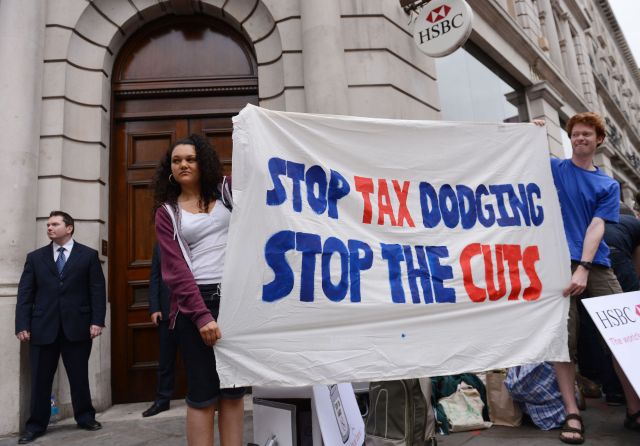Tax avoidance and a tax system biased towards big business and the wealthy is undermining faith in capitalism. – Credit: Stefan Rousseau/PA Archive/PA Images
When it comes to tax, there’s one set of rules for big business and the rich, and another for everyone else. Remember the tax deal with Google, made by George Osborne, then Britain’s Chancellor, who hailed it a “major success”? The $800 billion internet giant had generously agreed to pay £130 million to Her Majesty’s Revenue and Customs. Amounting to an effective tax rate of 3%, that sum, agreed in 2016, was to cover tax it owed since 2011.
How many small businesses would get away with that?
A 2016 report by Oxfam America suggested tax avoidance by multinationals was costing the US around $111 billion a year. In an astonishing finding, they reported that between 2008 and 2014, the “50 largest US companies collectively received $27 in federal loans, loan guarantees and bailouts for every $1 they paid in federal taxes”.[1. .‘Broken at the top’, Oxfam America, 14 April 2016]
More recently, the Paradise Papers, published late last year, provided the latest in a long list of revelations about morally-compromised corporate behaviour: Apple sent its lawyers out to shop for offshore tax havens; mining multinational Glencore has a staggering 107 offshore companies; and the intellectual property of sporting Goliath Nike is nationless.
It’s not only corporates. The Paradise Papers, like the Panama Papers before them, also exposed the super-rich individuals using offshore accounts. What do cash-rich companies have in common with cash-rich individuals? Expensive accountants – dedicated to finding the loopholes and schemes that allow those with the broadest shoulders to bear the lightest (tax) load. Ordinary families, however, like small businesses, can’t afford to avail themselves of such services.
“But they would if they could”, will be the retort of some, followed by: “Anyway, it’s all perfectly legal.” And I think there’s some truth in that. No one likes paying tax – just look at the tax gap. HM Revenue and Customs, the UK tax authority, estimates it to be £34 billion – which is driven by behaviours ranging from criminality, through “failure to take reasonable care”, to avoidance. And SMEs are bigger culprits than big business, accounting for 46% of the tax gap compared to 28% for larger companies.[2. .Measuring tax gaps 2017 edition: Tax gap estimates for 2015-16, HM Revenue and Customs, 26 October 2017]
But it is the cosy, back-scratching relationship between money and politics that distinguishes the rich from the rest. Sweetheart deals are for the big boys that governments court… such as Google.
The recent Republican tax reforms prove the point. American corporations are avoiding paying tax by offshoring their profits, so instead of dealing with that, Congress pass a bill that, as Vox so aptly put it, provides “a giant permission slip for shipping profits overseas”.[3. Dylan Matthews, ‘The tax bill is a giant permission slip for shipping profits overseas’, Vox, 19 December 2017]
President Trump’s tax cuts also benefit the very wealthy – who just happen to be political donors – above the ordinary working families he promised to champion. Washington non-profit, the Institute on Taxation and Economic Policy, reports that in 2019 the top 5% richest households will receive more than 50% of the bill’s benefits, while the bottom 40% will receive 5%.[4. .‘The Final Trump-GOP Tax Plan: National and 50-State Estimates for 2019 & 2027’, Institute for Taxation and Economic Policy, December 2017]
In the UK, the tax system is likewise skewed in favour of the wealthy. Just look at the lower rates of tax charged on income from capital compared to income from labour. A shift worker putting in 40 hours pays a higher rate of tax on their earnings than the property speculator pays on their profits. Which is a double blow when you consider that the profit has been made, at least in part, because of the investment of a local community and its taxpayers (in roads, buses, parks, policing…). That’s not about avoidance, it’s in-built bias.
78% of Americans and 76% of Brits believe “the economy of my country is rigged to advantage the rich and the powerful”.[5. .Global Trends. Fragmentation, Cohesion and Uncertainty, Ipsos, 2017] When it comes to tax, they’re right – and, along with the other six ills of capitalism, it’s threatening the free market model. Time to stop lamenting the loss of faith in capitalism’s prosperity-generating power; time to start treating its ailments.
Throughout next week UnHerd is exploring how the UK tax system can be reformed to tackle the biases in personal taxation. Our latest audio-documentary, out tomorrow, asks: Can a wealth tax save capitalism?









Join the discussion
Join like minded readers that support our journalism by becoming a paid subscriber
To join the discussion in the comments, become a paid subscriber.
Join like minded readers that support our journalism, read unlimited articles and enjoy other subscriber-only benefits.
Subscribe